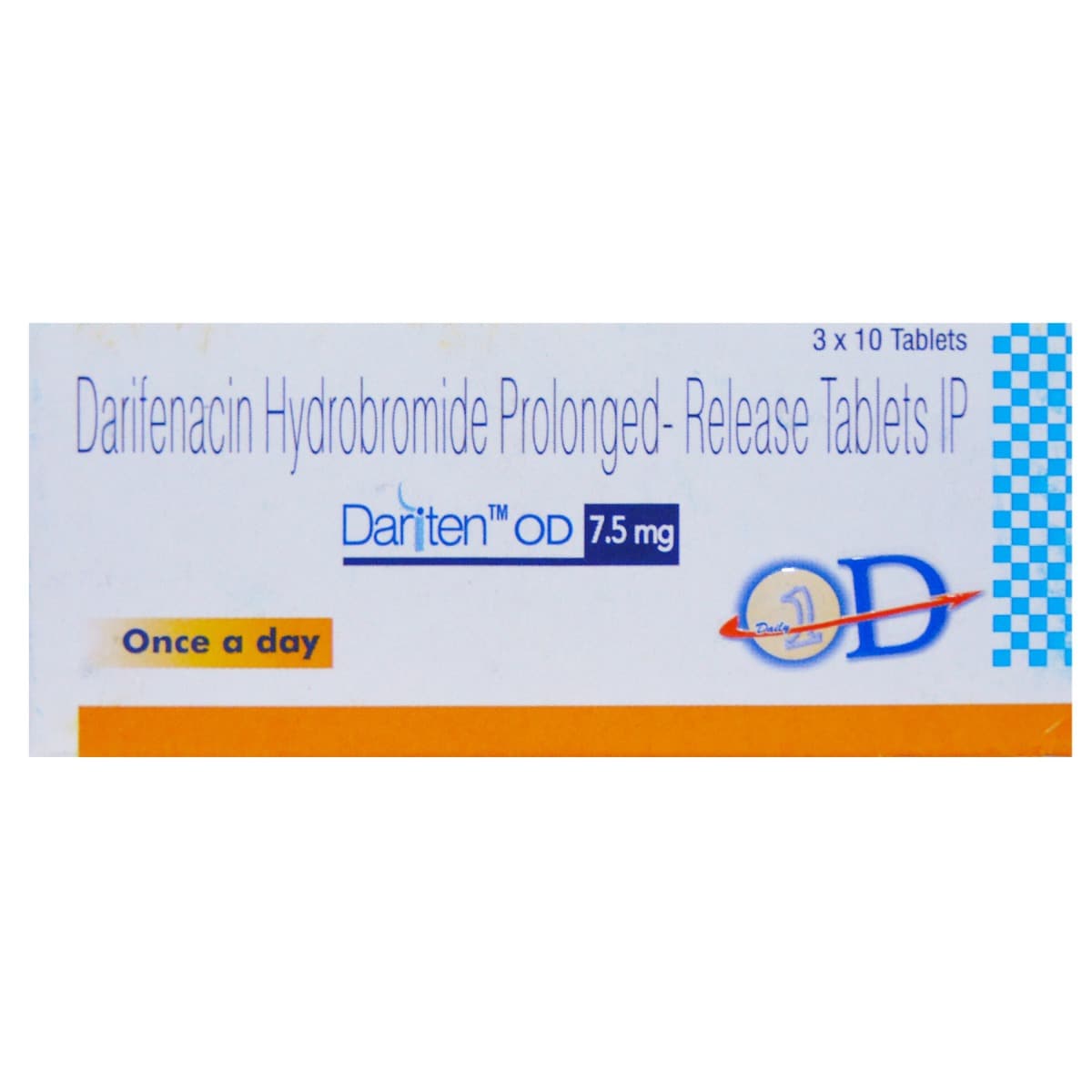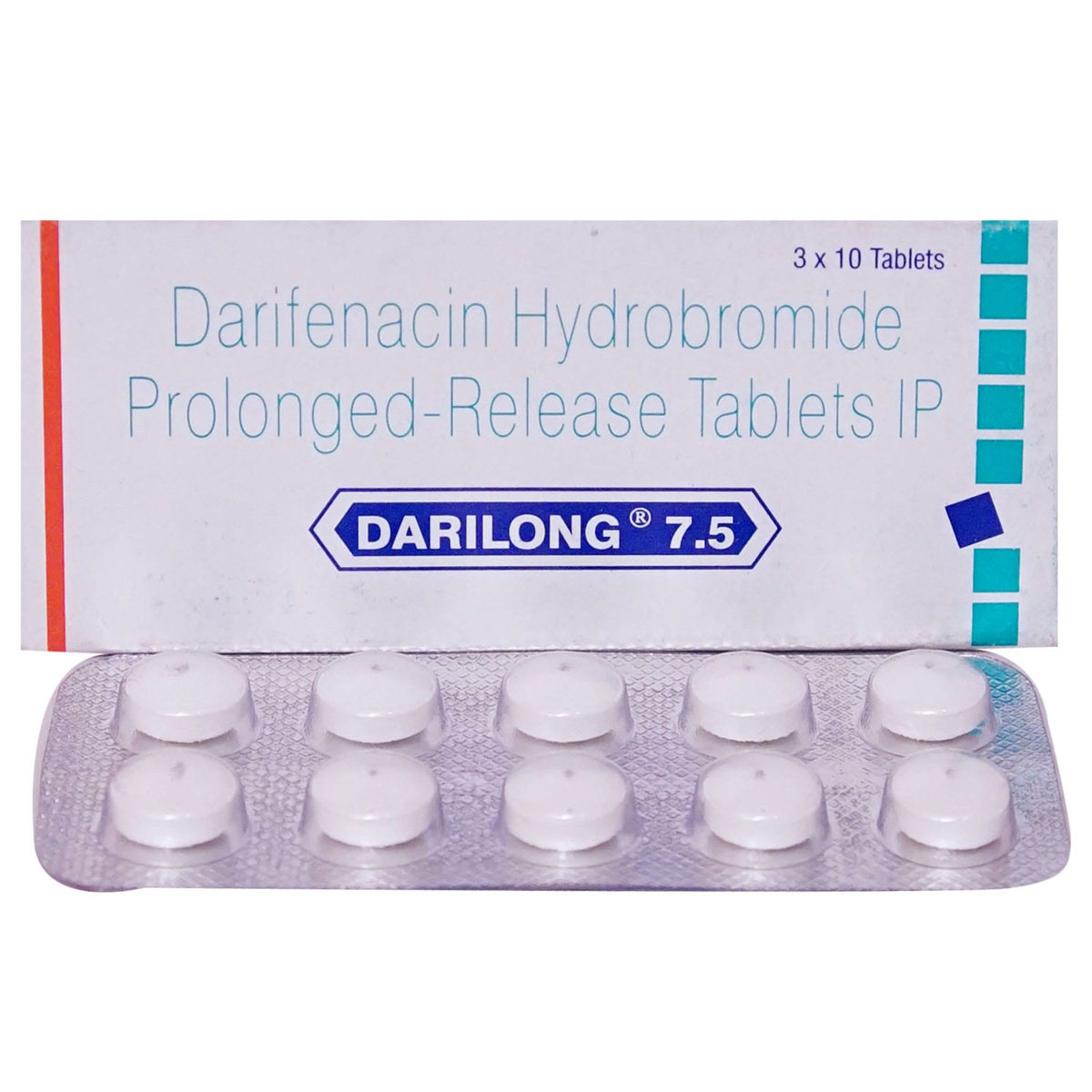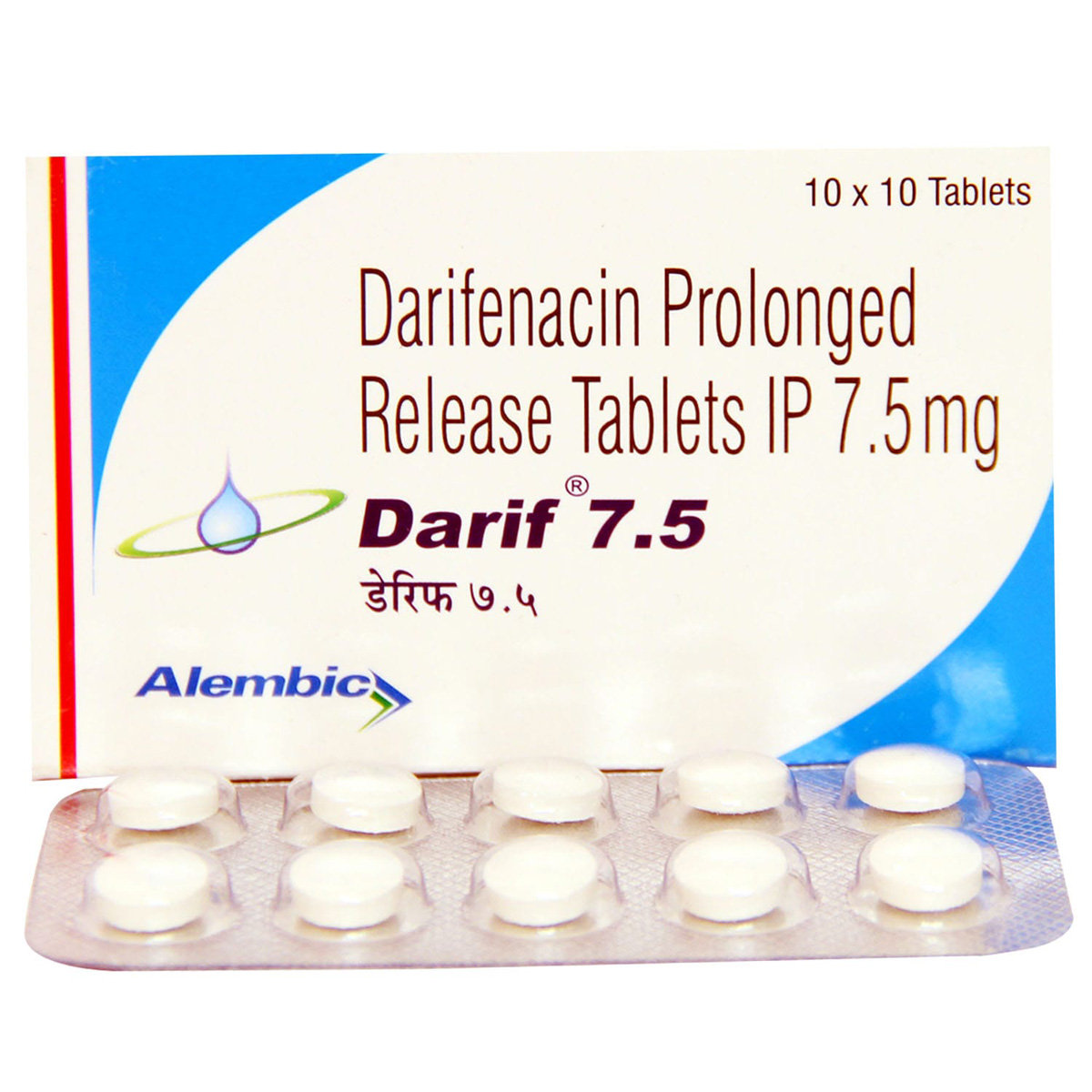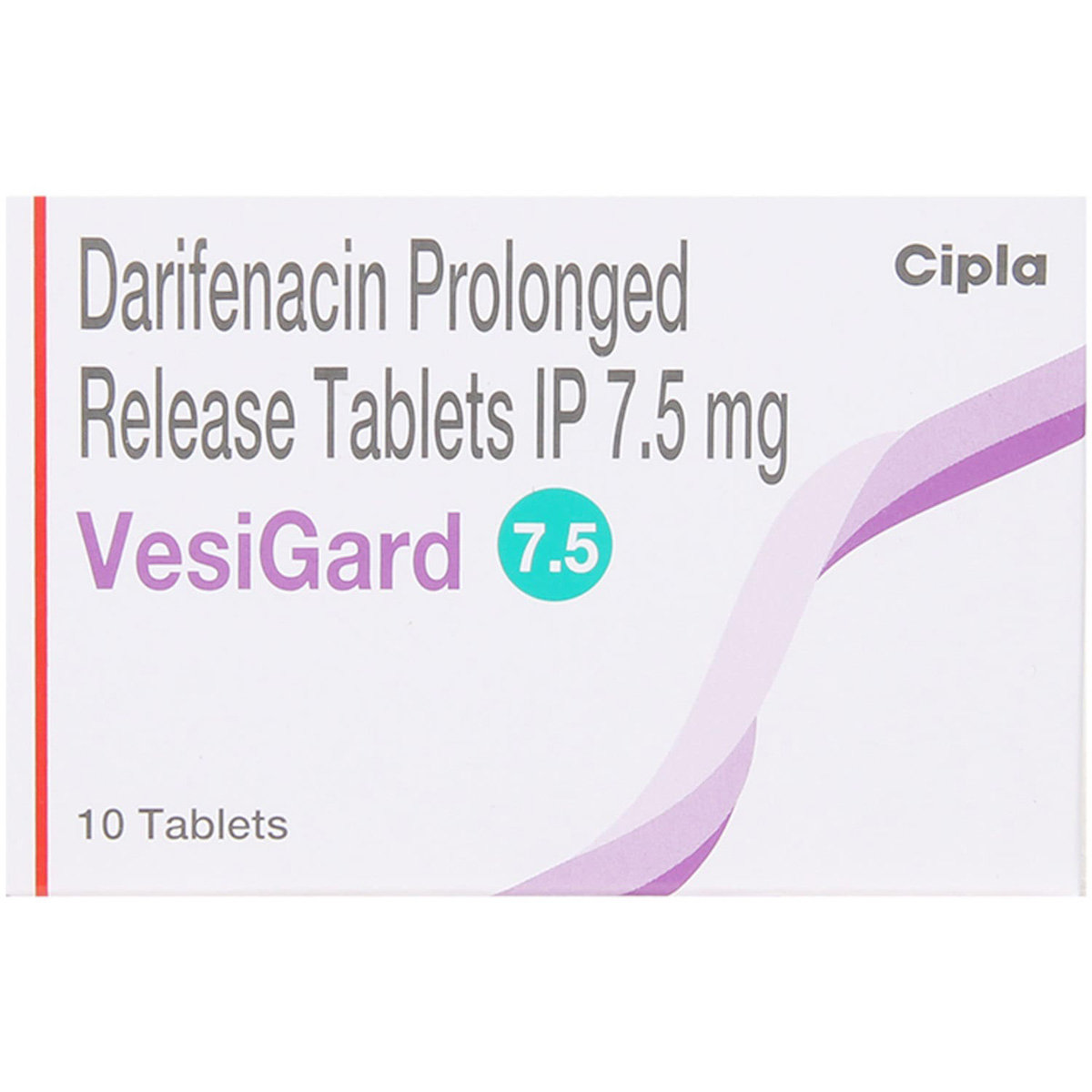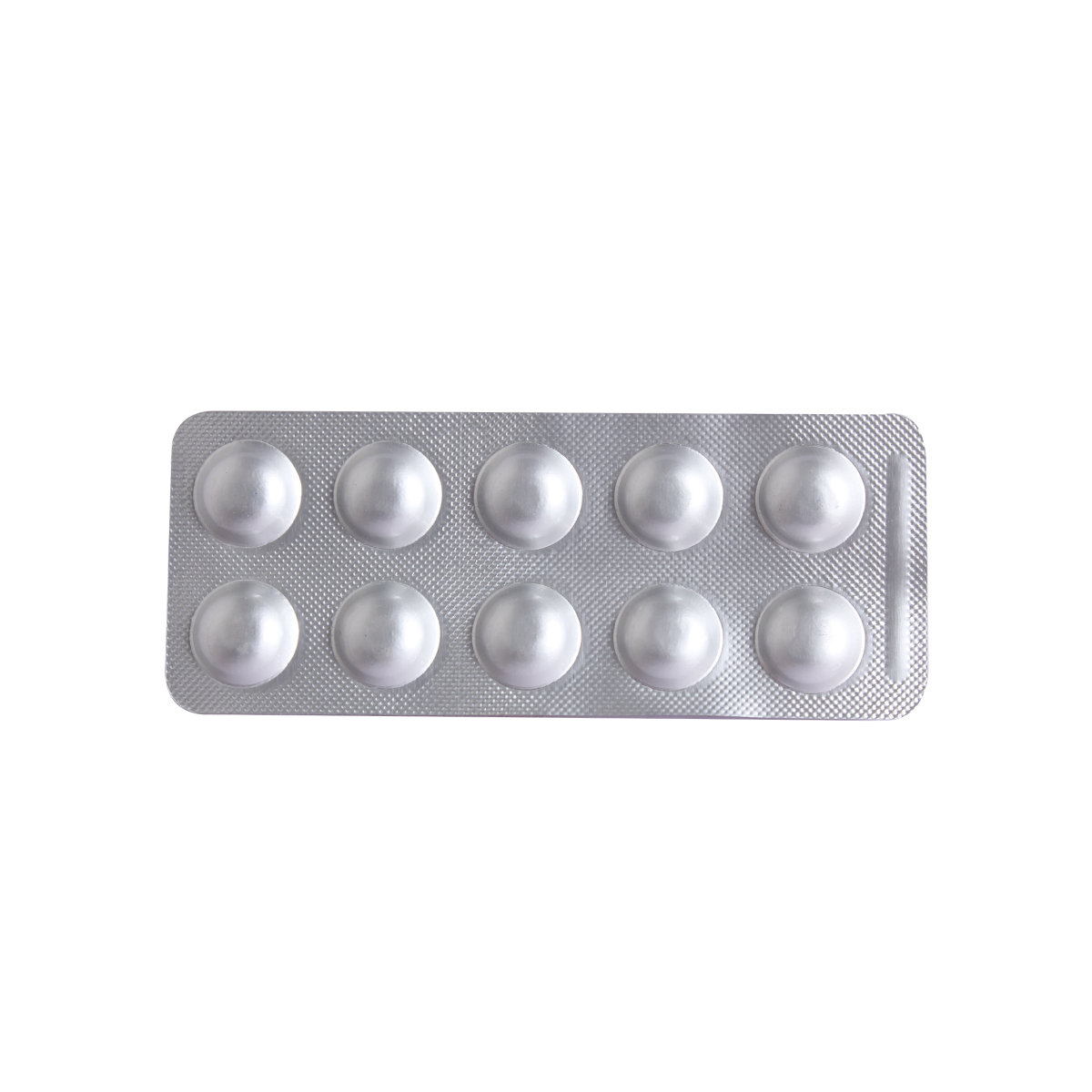Becigard 7.5mg Tablet
MRP ₹298.14
(Inclusive of all Taxes)
₹44.7 Cashback (15%)
Provide Delivery Location
Online payment accepted
 Prescription drug
Prescription drugWhats That
Composition :
Manufacturer/Marketer :
Consume Type :
Return Policy :
About Becigard 7.5mg Tablet
Becigard 7.5mg Tablet belongs to the group of medications called ‘antimuscarinic' or 'antispasmodics' primarily used in the treatment of overactive bladder (OAB) symptoms. Overactive bladder is a condition in which the urinary bladder muscles constrict uncontrollably thereby causing an urgent need to urinate, frequent urination, and inability to control urination.
Becigard 7.5mg Tablet contains ‘Darifenacin’ that relaxes the urinary bladder muscles which in turn decreases the activity of the overactive bladder. In an overactive bladder, muscle contractions occur before the full expansion of the bladder causing the patient to have frequent urges to urinate. Becigard 7.5mg Tablet stops these sudden contractions of urinary bladder muscles thereby enabling control over urination. Thus, it increases the amount and volume of urination that can be held by your bladder.
Take Becigard 7.5mg Tablet as prescribed by your doctor. You are advised to take Becigard 7.5mg Tablet for as long as your doctor has prescribed it for you depending on your medical conditions. You may experience dryness in the mouth, constipation, nausea, blurred vision, indigestion, and headache. Most of these side effects of Becigard 7.5mg Tablet do not require medical attention and gradually resolve over time. However, if the side effects are persistent, reach out to your doctor.
Before starting Becigard 7.5mg Tablet, please inform your doctor if you have any allergy with this Becigard 7.5mg Tablet or any other medicine or any type of foods. Talk to your doctor if you have glaucoma, liver disease. If you have trouble passing urine or slow clearing your stomach, then inform your doctor. Do not start, stop, or change the dose of Becigard 7.5mg Tablet without checking with your doctor. Inform your doctor if you are pregnant or plan on becoming pregnant. Inform your doctor if you are breast-feeding. You will need to discuss any risks to your baby.
Uses of Becigard 7.5mg Tablet
Directions for Use
Key Benefits
Becigard 7.5mg Tablet contains ‘Darifenacin’ that belongs to the class of medications called 'anticholinergics' or ‘antimuscarinic’. It can decrease the activity of the overactive bladder. In an overactive bladder, muscle contractions occur before the full expansion of the bladder causing the patient to have frequent urges to urinate. Becigard 7.5mg Tablet can stop these sudden contractions of bladder muscles. It enables control over urination and increases the amount of urine that can be held by your bladder.
Storage
Drug Warnings
Before starting Becigard 7.5mg Tablet, please inform your doctor if you have any allergy with this Becigard 7.5mg Tablet or any other medicine or any type of foods. Talk to your doctor if you have glaucoma, liver disease. If you have trouble passing urine or slow clearing your stomach, then inform your doctor. Do not start, stop, or change the dose of Becigard 7.5mg Tablet without checking with your doctor. A very bad reaction called angioedema (swelling of the face, hands, eyes, lips, throat, tongue, or difficulty in breathing and swallowing) has happened with Becigard 7.5mg Tablet. Get medical help immediately if you have any of these symptoms. Sometimes, this may be life-threatening. Avoid driving and doing other activities that require concentration until you see how Becigard 7.5mg Tablet affects you. Inform your doctor if you are pregnant or plan on becoming pregnant. Inform your doctor if you are breast-feeding. You will need to discuss any risks to your baby.
Diet & Lifestyle Advise
- Eat fresh fruits like pears, banana, citrus fruits, and green vegetables like beans and potatoes.
- Try to take cranberry juice as it helps in minimizing urinary infections.
- Avoid coffee, tea, and carbonated drinks that contain caffeine.
- Do not consume processed, fried, or spicy foods, as these foods can irritate your bladder. Limit alcohol intake as it can increase the risk of side-effects.
- Quit smoking and exercise regularly.
Side Effects of Becigard 7.5mg Tablet
- Dryness in mouth
- Constipation
- Nausea
- Blurred vision
- Indigestion
- Headache
Habit Forming
Therapeutic Class
All Substitutes & Brand Comparisons
RX
Out of StockDarinacin 7.5mg Tablet
Ant Pharmaceuticals Pvt Ltd
₹228
(₹20.52 per unit)
23% CHEAPERRX
Dariten OD 7.5 Tablet 10's
Sun Pharmaceutical Industries Ltd
₹358
(₹32.22 per unit)
20% COSTLIERRX
Darilong 7.5 Tablet 10's
Sun Pharmaceutical Industries Ltd
₹358
(₹32.22 per unit)
20% COSTLIER
FAQs
Becigard 7.5mg Tablet is used to treat an overactive bladder in which an individual is unable to control urination and always have a strong urge to urinate. Becigard 7.5mg Tablet prevents these sudden bladder muscle contractions and increasing the volume and amount of urine that the bladder can hold. Thus, Becigard 7.5mg Tablet helps to control the release of urine and helps reduce symptoms of OAB like a strong need to urinate, frequent urination, and reduced urine flow.
Becigard 7.5mg Tablet may cause blurred vision in some cases and may harm your thinking or reactions. Consult your doctor immediately if this condition persists or worsens while using this Becigard 7.5mg Tablet.
Becigard 7.5mg Tablet is used to treat symptoms of overactive bladder like sudden or frequent rush to the toilet or outflow of urine.
Antifungal medicine may interact with Becigard 7.5mg Tablet. So, inform your doctor about all the prescription and non-prescription medicines before taking Becigard 7.5mg Tablet to avoid unwanted effects.
Dry mouth is the most common side effects of Becigard 7.5mg Tablet, so you can drink plenty of fluids or water, suck hard candy or ice chips, chew (sugarless) gum, or use a saliva substitute. However, if you are a kidney patient before taking any fluid or electrolytes, it is better to consult a doctor.
Drug-Drug Interactions Checker List
- AMPRENAVIR
- ATAZANAVIR
- INDINAVIR
- KETOCONAZOLE
- DONEPEZIL
- BOCEPREVIR
- MIBEFRADIL
Special Advise
- Intake of Becigard 7.5mg Tablet can make you sweat less, thereby increasing the chance of having a heat stroke in summer. So, avoid doing tasks that may cause you to overheat.
- Intake of Becigard 7.5mg Tablet may occasionally cause blurry vision and dizziness so avoid driving a motor vehicle, operate heavy machinery, and performing hazardous tasks that require mental alertness as well.
Disease/Condition Glossary
Overactive bladder (OAB): In normal conditions, when the urinary bladder is filled with urine, it sends a message to the brain that an individual is ready to urinate. During the urination process, bladder muscles contract which ultimately leads to a uniform flow of urine. Contrary to this, in an Overactive bladder (OAB), the urinary bladder muscles start contracting before the urine is filled in the urinary bladder, thereby causing frequent urges to urinate. Becigard 7.5mg Tablet prevents this sudden bladder muscle contractions and increasing the volume and amount of urine that the bladder can hold. Thus, Becigard 7.5mg Tablet helps to control the release of urine and helps reduce symptoms of OAB like a strong urge to urinate, frequent urination, and reduced urine flow.

Have a query?
Alcohol
Safe if prescribed
Avoid taking alcohol as it may increase the risk of dizziness.
Pregnancy
Consult your doctor
Becigard 7.5mg Tablet is a category C medicine. It should be used in pregnant women if the benefits outweigh the risks.
Breast Feeding
Consult your doctor
Becigard 7.5mg Tablet should be used in breastfeeding mothers only if clinically needed.
Driving
Safe if prescribed
Becigard 7.5mg Tablet may cause dizziness and blurred vision and sleepiness. So, avoid driving or operating heavy machinery after using Becigard 7.5mg Tablet.
Liver
Consult your doctor
Becigard 7.5mg Tablet should be used with caution in patients with liver diseases
Kidney
Consult your doctor
Becigard 7.5mg Tablet should be used with caution in patients with kidney diseases.
Children
Safe if prescribed
Not recommended for use in children below 18 years of age due to a lack of data on safety and efficacy.




